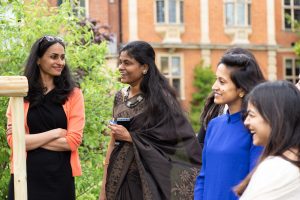Dr. Radhika Khosla was appointed the Research Director for the Oxford India Centre for Sustainable Development in 2018. In this interview, originally published in the 2019 Alumni Magazine, she discusses how the OICSD works towards solving the most pressing problems of our time.

Dr. Radhika Khosla discusses her work for the Oxford India Centre for Sustainable Development and the broader aims of the centre, a unique and dynamic partnership between Oxford and India. Photo: Keith Barnes
Your research is on urban environments and climate change – what drew you to this?
A physicist by training, I have always been interested in the interaction between the science discussed in the classroom and its meaning in the everyday world. This is what drew me to an undergraduate Physics degree at Oxford and my doctorate in the Geophysical Sciences at the University of Chicago, where I examined how the natural environment interacts with the urban built environment.
My work evolved in the following years which I spent working on environmental policy in the US and in India, with a focus on the fundamental question of how cities in transition – where most of the world’s population are projected to live – manage the tensions between growing energy needs for development, and protecting the local and global environment.
Climate change sits at the heart of these issues, as it works as a stress-multiplier across all aspects of our economy and society.
The complexity of the problem also means that it cannot be viewed through only one discipline alone but rather requires an integrated and interdisciplinary response, with active engagement between academia and the public and private sectors.
Why is an organisation like Oxford India Centre for Sustainable Development (OICSD), with its focus on interdisciplinarity and on India, important for the research you do?
India is in the midst of multiple transitions, in its urbanization patterns, workforce, built environment, among others. These transitions present an opportunity for development and a
better quality of life for millions, which will be delivered with an associated increase in energy use.
On the other hand, India, like all other countries, recognizes the urgent need to reduce global greenhouse gas emissions. The country has a particular duality of being one of the largest current carbon dioxide emitters, but with one of the lowest rates of per capita emissions. How India takes on the question of this rapid development and growth while also addressing the mitigation and adaptation of climate change becomes particularly significant.
The OICSD is a unique place in which to examine these debates. It brings together people who work on the most complicated questions on the environment and development and provides an opportunity for the intersection of different intellectual approaches.
This is true of the Centre’s research across issues – for instance, on food and water security, our scholars work to understand efficient methods of irrigation in agriculture that align with the social and cultural concerns of Indian farmers.
Another example is our researchers’ work on developing smartphone technology to assist in the detection of Parkinson’s to help manage the increasing burden on health infrastructure.
What is the relationship between research and practice at the OICSD?
The OICSD brings together the larger ambition of supporting new research on sustainable development and its effective translation to solving the most pressing problems of our time.
The goal is to consider different dimensions of sustainable development through their particular disciplinary lens, and equally, their interactions amongst each other – for example, the feedbacks between clean energy and water, climate change, health, effective governance, among others.
The centre rests on three pillars – excellent research, supporting a cohort of scholars who further this research to become leaders in their fields, and to create a broader community within the public, private and civil society spheres who engae with us on the implications of our research in the wider world.
What is the next big step, research-wise?
I am leading a new programme on the Future of Cooling based at the Oxford Martin School which has a team of expert researchers from across the university, including the Smith School of Enterprise and the Environment (where I am also based), Engineering and the Medical Sciences. The goal of the new programme is to examine and help shape the unprecedented increase in cooling energy demand growth.
We are at the threshold beyond which energy needed for cooling from air conditioners (ACs) is projected to triple by 2050 globally, with 10 new ACs to be sold every second for the next 30 years. The project will examine cooling as an integrated system of key social and technical components, and identify the ways in which its current trajectory can deliver sustainable development.
The position will focus on examining how and why households in fast-growing countries are making large increases in their cooling energy needs, and the ways in which to moderate this shift.
The experts leading the project will also look the effects of extreme heat on healthcare systems in the developed world, which are unprepared for frequent heat waves from climate change.
In addition, we will work on the sustainability of the global production network of cooling, including on the uptake of more sustainable coolant gases. The aim of the project is to make important new academic contributions that have impact outside academia.
It is strategically poised to capitalize on the available window of opportunity, before cooling demand gains full momentum and gets locked-in over the coming decade.
This is very much in keeping with the OICSD’s goal towards undertaking new research, with impact, towards sustainable development.
You can learn more about the work of the OICSD here.